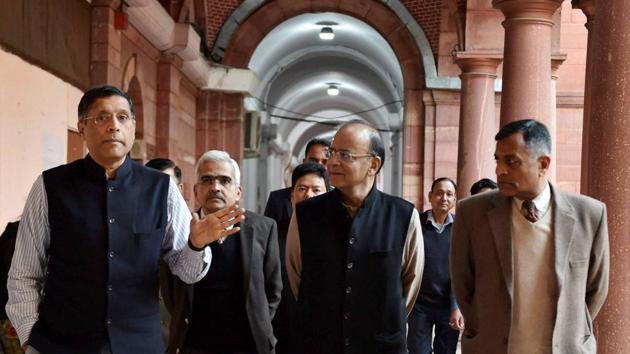Economic Survey: India’s 2017-18 growth seen recovering fast after note ban
India’s economy could grow by between 6.75% and 7.5% in 2017-18, a government survey said on Tuesday, within an earlier government forecast for the same period.
India’s economy could expand by between 6.75% and 7.5% in 2017-18, a government survey said on Tuesday, signalling that growth could recover sooner than expected after a shock scrapping of high-value banknotes to fight “black money”.

The cash ban, however, will slow down growth for 2016/17 to below 7%, said the Economic Survey, which is an annual government report on the economy that also sets the tone for the general budget and floats new policy ideas. Finance minister Arun Jaitley will present his fourth annual budget on Wednesday.
“The cash squeeze… will have significant implications for GDP, reducing 2016-17 growth by ¼ to ½ (0.25 to 0.5) percentage points compared to the baseline of 7%,”the survey said. It put the growth rate in the first eight months of the current financial year at 7.1%.
The survey comes barely three months after Prime Minister Narendra Modi pulled out about 86% of all cash from the economy, disrupting economic activity in Asia’s third-largest economy and hit particularly the poor.
The survey said “demonetisation” would bring long-term benefits to the economy. It also said structural reforms and a proposed Goods and Service Tax could boost growth rate to 8-10%.
The survey, which is authored by government’s chief economic advisor, suggested quick replenishment of cash in the economy and free convertibility of cash to deposits to stem any GDP growth deceleration.
“The Indian economy has sustained a macro-economic environment of relatively lower inflation, fiscal discipline and moderate current account deficit coupled with broadly stable rupee-dollar exchange rate,” it said.
The Economic Survey pegged growth in the agriculture sector at 4.15% in 2016-17, significantly higher than the 1.2% in 2015-16. This is primarily because of better monsoon rains during the current financial year.
Also, growth in the industrial sector was estimated to moderate to 5.2% in 2016-17 from 7.4% the previous financial year, it said.
Radical income idea
The survey also backed a universal basic income for the poor, replacing existing welfare schemes, but added the time probably wasn’t right for its introduction.
A form of universal basic income was tested in Madhya Pradesh in 2011, with direct cash transfers to the accounts of beneficiaries. From guaranteed jobs for the rural poor to an expensive food security plan, the government runs several welfare schemes but these have suffered from leakages, and therefore, achieved limited success.
“… the UBI is a powerful idea whose time even if not ripe for implementation, is ripe for serious discussion,” the survey said.
“Based on the principles of universality, unconditionality and agency, is a conceptually appealing idea but with a number of implementation challenges lying ahead especially the risk that it would become an add-on to, rather than a replacement of, current anti-poverty and social programmes, which would make it fiscally unaffordable.”





